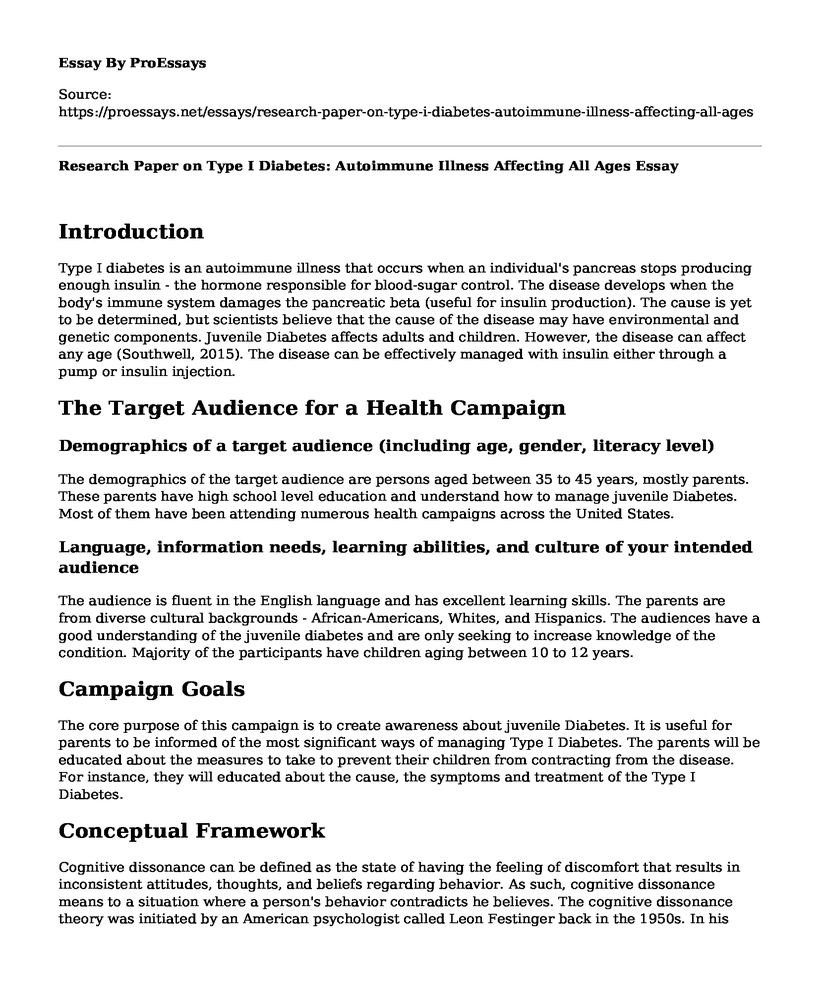Introduction
Type I diabetes is an autoimmune illness that occurs when an individual's pancreas stops producing enough insulin - the hormone responsible for blood-sugar control. The disease develops when the body's immune system damages the pancreatic beta (useful for insulin production). The cause is yet to be determined, but scientists believe that the cause of the disease may have environmental and genetic components. Juvenile Diabetes affects adults and children. However, the disease can affect any age (Southwell, 2015). The disease can be effectively managed with insulin either through a pump or insulin injection.
The Target Audience for a Health Campaign
Demographics of a target audience (including age, gender, literacy level)
The demographics of the target audience are persons aged between 35 to 45 years, mostly parents. These parents have high school level education and understand how to manage juvenile Diabetes. Most of them have been attending numerous health campaigns across the United States.
Language, information needs, learning abilities, and culture of your intended audience
The audience is fluent in the English language and has excellent learning skills. The parents are from diverse cultural backgrounds - African-Americans, Whites, and Hispanics. The audiences have a good understanding of the juvenile diabetes and are only seeking to increase knowledge of the condition. Majority of the participants have children aging between 10 to 12 years.
Campaign Goals
The core purpose of this campaign is to create awareness about juvenile Diabetes. It is useful for parents to be informed of the most significant ways of managing Type I Diabetes. The parents will be educated about the measures to take to prevent their children from contracting from the disease. For instance, they will educated about the cause, the symptoms and treatment of the Type I Diabetes.
Conceptual Framework
Cognitive dissonance can be defined as the state of having the feeling of discomfort that results in inconsistent attitudes, thoughts, and beliefs regarding behavior. As such, cognitive dissonance means to a situation where a person's behavior contradicts he believes. The cognitive dissonance theory was initiated by an American psychologist called Leon Festinger back in the 1950s. In his argument, he emphasized on the need to maintain a consistent relationship between beliefs and behaviors. The victims of cognitive dissonance relieve the tension by rejecting or avoiding the information (Wright et al., 2012). They try to console themselves that the problem did not exist at all. People experience conflict at different degrees due to several factors like the degree of inconsistency in their beliefs and the value of the view to them; because dissonance makes people feel uncomfortable, people always strive to reduce it through the change of attitude, behaviors, or believes or others minimize the degree of importance of their beliefs. For dissonance to occur, a person must hold the feeling with so much faith, made a commitment, there be a relationship between the belief and the real world and the belief must have a social backing. According to the cognitive dissonance theory, when two ideas or actions are psychologically inconsistent, people do all it takes to change them and align with their beliefs. The discomfort is usually triggered by an individual's beliefs conflicting with the newly perceived information. In this case, a person would find a way of resolving the contradiction. To functionally, human beings naturally strive for psychological internal consistency.
References
Southwell, B. G. (2015). On the need for a life-span approach to health campaign evaluation. Health communication, 25(6-7), 525-528.
Wright, K., Sparks, L., & O'Hair, D. (2012). Health Communication in the 21st Century (2nd ed). Wiley-Blackwell. ISBN: 978-0470672723 and ISBN: 0470672722
Cite this page
Research Paper on Type I Diabetes: Autoimmune Illness Affecting All Ages. (2023, May 09). Retrieved from https://proessays.net/essays/research-paper-on-type-i-diabetes-autoimmune-illness-affecting-all-ages
If you are the original author of this essay and no longer wish to have it published on the ProEssays website, please click below to request its removal:
- Case Study Example of a Sepsis/SIRS Patient
- Essay on Nursing: Registered Nurse Licensed Practical and Licensed Vocational Nurses
- Supplemental Nutrition Programs Essay Example
- Pathophysiology of Polycystic Ovarian Syndrome Paper Example
- Essay Sample on Drug Overdose
- Essay on Hematologist-Family Nurse Practitioner Collaboration: A Must-Have Skill
- Application Sample on Healthcare-Associated Infections: A Risk for Healthcare Providers & Patients







